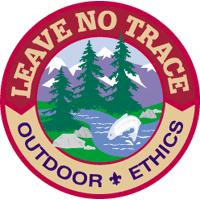
Dispose of Waste Properly
The Little Things in Life
Use this activity to introduce the Dispose of Waste Properly principle.
Goal
Participants will develop a sense of the compounded impact from many small bits of waste.
Time
10 minutes
Objectives
Participants will be able to:
- Identify micro-trash and the need to prevent it
- Prevent litter before it happens
- Keep a campsite clean and leave it cleaner than when they arrived
Materials
- Large plastic bag
- Pop-Tart or Ramen Noodles pouch
Motivator
- Cute, furry animals quickly become pests when they learn to find food. This is dangerous to people and the animals.
- Small amounts of litter add up and become an eyesore.
Presentation
This can either be done as an interactive demonstration or a skit. Choose the one that will best fit the audience.
Interactive Demo
- Hold up the pop-tart and ramen noodle bags. Ask which one the participants would prefer to eat - it doesn't matter which one. Whichever one they choose, say that we'll have to share this one bag since I didn't bring more.
- Crush the bag - explain that I'm simulating what it would be like after a day in my backpack and I need to break it into pieces for everyone to get a share.
- Tear the bag open over the table, dropping some noticable crumbs. If I can tear a few small pieces off the wrapper, that's even better. Pour the contents into the large plastic bag, crumple up the wrapper and set it aside. Having a few bits miss the bag is even better.
- Try a bit from the bag and pass it around the group. While they are each taking a bit, talk about:
- Both foods are high in calories and are common trail food
- Ask which one they feel would be more attractive to chipmunks, squirrels, and the like? (both)
- Which one is the bigger concern for litter? (pop-tart wrapper is shiny metallic, more possible left-overs from noodles, dishes to clean)
- When the bag has been passed around, ask everyone to look at the front of their shirt, their lap, the table and see if they dropped any crumbs. Ask who brushed their hands together after eating.
Ask if those miniscule food bits matter at all - hopefully someone will have noticed the more obvious mess I made when opening the package. - Ask for suggestions on what I might have done differently. (opened it more carefully, keep the wrapper in one piece, opened it over a plastic bag or bandana)
Skit
One actor is careless in opening and eating food and drops crumbs and bits of wrapper all over. The other is careful and uses some simple tricks. A single person can play both roles.
Introduce Crumbly Carl - a very hungry backpacker that just arrived at his campsite and wants a snack...
-
Crumbly Carl
- Hold up the pop-tart and ramen noodle bags. Ask which one the participants would prefer to eat - it doesn't matter which one. Whichever one they choose, agree with them and say it's my favorite too.
- Tear a corner off the wrapper and drop it as you grab more of the wrapper to tear open.
- Break a piece off and eat it, being sure to drop a few crumbs when you pull it from the package and bite it.
Introduce Sanitary Sam - another very hungry backpacker...
-
Sanitary Sam
- Hold up the package that is left and mention that I lucked out because this is my favorite too.
- Take out a large zip-loc bag and open it up.
- Hold the snack over the open bag and tear the package open, but keep it all in one piece. Mention that keeping it in one piece prevents lost bits and holding it over the plastic bag will catch any dropped crumbs.
- Hold the snack inside the plastic bag and break a piece off. Eat it carefully, dropping no crumbs.
Reflection
- Explain that there are three times when food litter is usually dropped - opening packages, eating, washing. Once it hits the ground people tend to leave it unless it's pretty big. By being careful and not dropping it, we prevent the problem.
- Trash litter usually occurs when opening food. That small bit of pop-tart wrapper is a great example.
- How can we minimize the chance of littering? (being aware, being careful, repackaging food)


